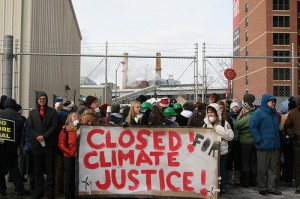I attended a conference a few days ago where a number of speakers lamented policies they call “the war on coal.” War is a harsh term, but in general they refer to the current Administration’s stated desire to wean the American economy of its dependence on coal for generating electricity. Both the White House and the EPA deny any “war on coal,” though the national media has reported significant email traffic between them and leaders of the Sierra Club’s “Beyond Coal” campaign.
 To me, the semantics of words like “war” can be debated at length, but that really misses the point. Lots of people think we should be looking for cleaner ways to produce electricity, so there is a legitimate discussion (not a war) about switching from coal to natural gas or some other technology.
To me, the semantics of words like “war” can be debated at length, but that really misses the point. Lots of people think we should be looking for cleaner ways to produce electricity, so there is a legitimate discussion (not a war) about switching from coal to natural gas or some other technology.
To have that discussion, though, without also considering the economic impact, also misses the mark. So many activists in non-mining communities think it doesn’t affect them one way or another, as long as the utilities are generating electricity from something. Just so the lights still come on when we flip the switch. But in Western Colorado, we should remain ever aware of the industry’s impact on our region.
Coal underlies about 30,000 square miles, about 20 million acres, of my home State of Colorado – that’s more than a fourth of the entire State. And Colorado still ranks eighth in the United States in reserves. The State has produced over 1 billion tons since 1861, and still has over 15 billion tons in the ground. Despite the switching of several large power plants, coal still produces about 2/3 of Colorado’s electricity, and 60 percent of the coal mined here is still shipped to other states. It is in demand elsewhere because Colorado coal is especially low in sulfur, ash, mercury, and trace elements.
This economic activity is especially important to the Western Slope because it is home to all 11 of the State’s active mines. Together those mines produce over $1 billion worth of coal a year and employ over 2,000 people. They also pay $58 million in federal and state royalties, $28 million in private landowner royalties, $4.5 million into the abandoned mined land reclamation fund, $14 million in property taxes, and another $14 million in severance and sales taxes for important local government projects. They do all this on a total permitted acreage of about 185,000 acres (remember there are almost 20 million acres of coal in Colorado), so the potential is even much greater.
The mining industry has developed several new “clean coal” technologies that have made tremendous air quality progress, of which we should all be proud. It is also noteworthy that local mines have done some remarkable environmental work, such as the dramatic recovery of Sharp-tail Grouse and other wildlife on reclaimed coal mine lands in Northwest Colorado.
Still, many people wonder whether we need coal at all. Isn’t there a better way to generate the electric power we need? On the scale we use, not really. The Minerals Information Institute says every American born today will require 587,000 pounds of coal, 5.7 billion cubic feet of natural gas, and 82,000 gallons of oil to maintain the same lifestyle we now live. To meet future demand over the next generation with our current mix of energy sources, the country would need to build 747 new coal and gas power plants, 52 new nuclear plants and 1,000 new hydro-electric dams. That is not going to happen, so what are our choices? We have spent huge sums of public money trying to subsidize into commercial viability more “renewable” sources, but even with the impressive growth of renewables, all alternative energy combined still only provides about 9 percent of America’s energy. Coal remains vital for the foreseeable future.
We need a serious discussion about our energy future, not a political “war.” Personally, I don’t care for these hyperbolic terms so common to today’s politics. White House “czars,” health care “death panels,” “war on women,” “war on poverty,” “war on coal.” It’s all so over-the-top. I’d just as soon declare war on all these wars, and let the great American economic engine get back to producing, selling, hiring, profiting, and prospering.
(A version of this column appeared in the Grand Junction Daily Sentinel April 17, 2015)




Comments on this entry are closed.